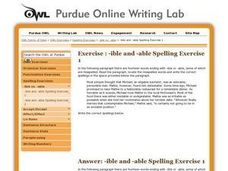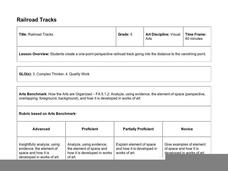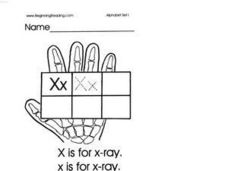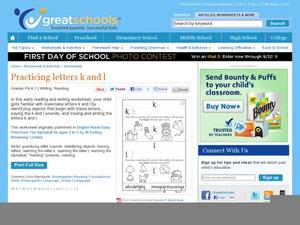Curated OER
Maus: Cubing Questioning Strategy
Maus is the text for a postreading activity that has class members using a cubing strategy to analyze, in depth, topics (racism, past and present, forgetting/remembering the Holocaust, representing the Holocaust) associated with Art...
Curated OER
Vocabulary Building
A fabulous language arts lesson has readers focus on the vocabulary in the key words, expand and build new vocabulary, and practice three grammar concepts. They recognize key words as they relate to communicating at work. Pupils build...
Teaching English
In Flanders Fields
War is one of the most profound human experiences in history, and is often best depicted in works of art and literature. Introduce class members to the poetry of World War I with this resource that uses John McCrae's "In Flanders Fields"...
SEN Teacher
Literacy Printables : Handwriting 2
Celebrate National Handwriting Day with a variety of worksheets designed to warm up young writer's hands. Learners work on tracing figures such as curves, ellipses, mounds, and more.
Curated OER
Spelling Exercise: -ible or -able
From the Purdue Online Writing Lab, an editing practice exercise that focuses on the correct spelling of words that end in -ible or -able. Young authors proofread a paragraph about a date gone awry (high interest content). Onscreen it...
University of Texas
Alphabetic Understanding, Phonics, and Spelling
Have your youngsters reading in no time with with collection of literacy activities and lessons. Starting with a basic understanding of the alphabet, this unit progressively builds students' phonemic awareness and ability to decode...
Curated OER
What's Outside the Window
What do your students see when they look outside the window? This project lets their imagination go wild, and lets you see what kind of daydreaming they do best. They each draw, paint, and color an image of what they imagine as they are...
Hawaiʻi State Department of Education
Railroad Tracks
Ahhh the vanishing point! Sounds ominous, but it's not. Fifth graders analyze the use of perspective in Renaissance art. They practice using linear perspective to draw railroad tracks that seem to go on forever. Tip: Make this...
Institute for Teaching through Technology and Innovative Practices
The Right Number of Elephants
How can you tell if a number of items is reasonable? Combine math and language arts with a fun lesson based on Jeff Shepard's The Right Number of Elephants. After reading the book, kids discuss amounts of other items and create...
MENSA Education & Research Foundation
Hurricanes
Learn the ins and outs of hurricanes through a series of lessons answering, "What is a hurricane? How does it travel? How is one formed, measured, and named?" Information is presented through informative text and images, while...
Curated OER
Printing Lowercase M
Watch the magic pencil! Beginning printers practice lowercase m, first examining how the magic pencil writes it. Consider creating a "magic pencil" for your class, and inviting willing participants up to demonstrate proper handwriting...
Curated OER
Printing the Letter A
In this tracing letter a activity, learners trace 10 dotted examples of upper and lower case Zaner-Bloser letter a. There is tracing only on this page.
Curated OER
Printing Letter Uu-- Upper and Lower Case
For this printing practice worksheet, students learn to write both upper and lower case Zaner-Bloser letter Uu. Students trace several examples, then write their own letters underneath 6 pictures of letter U words. Note: The examples are...
Basic Handwriting for Kids
S is for Squirrel: Printing the Letter S
In this letter S worksheet, learners can move a computer mouse over arrows guiding the formation of the letter, then practice printing both the upper and lower case letter.
Basic Handwriting for Kids
R is for Ring: Practice Printing Letter R
In this letter R worksheet, learners can move a computer mouse over arrows guiding the formation of the letter, then practice printing both the upper and lower case letter.
Basic Handwriting for Kids
R is for Rancher: Practice Printing Letter R
In this letter R learning exercise, students can move a computer mouse over arrows guiding the formation of the letter, then practice printing both the upper and lower case letter.
Curated OER
DeNelian Printing: Toys
In this printing practice worksheet, students learn to write the names of 6 common toys in DeNelian style printing. Students trace the dotted examples before forming their own words on the lines.
Curated OER
Practice Printing - 1/2 and Full Circles
In this printing practice activity, students trace the dotted lines to print 1/2 circles and full circles. They fill the page with independently written examples.
Curated OER
DeNelian Printed Alphabet with Direction Arrows
In this language arts worksheet, learners learn to form both upper and lower case examples of DeNelian letters A-Z. Students trace the examples, following the direction arrows and then form their own letters on the lines.
Curated OER
Alphabet Print and Match
In this alphabet worksheet, students practice writing the letters of the alphabet in both upper and lower case. Next, they match the upper case letter to the lower case letter. Finally, they once again, practice writing each letter of...
Curated OER
Language Arts: Creating Multimedia Reports
Ninth graders create multimedia presentations about their backgrounds and family heritage. They discover how to use the necessary computer skills and practice them in pairs. Students present their projects to the class and have a general...
Curated OER
Alphabet Letter X
In this alphabet letter X worksheet, students read two short sentences, trace the uppercase and lowercase letter X once and then print both letters in the four boxes provided.
Curated OER
Practicing Letters k and l
Let's get to know the lowercase letters k and l. Scholars become familiar with both in this visual matching instructional activity. After tracing and printing each letter, they add them to an incomplete alphabet. Then, they draw lines...
Curated OER
Art On Trial (A Mock-Court Activity)
Students engage in a mock trial to decide if a work of prospective public art is "art" and accepted for a city park. They broaden their definitions of what "art" is. Students distinguish between opinion and informed judgment of art works.























